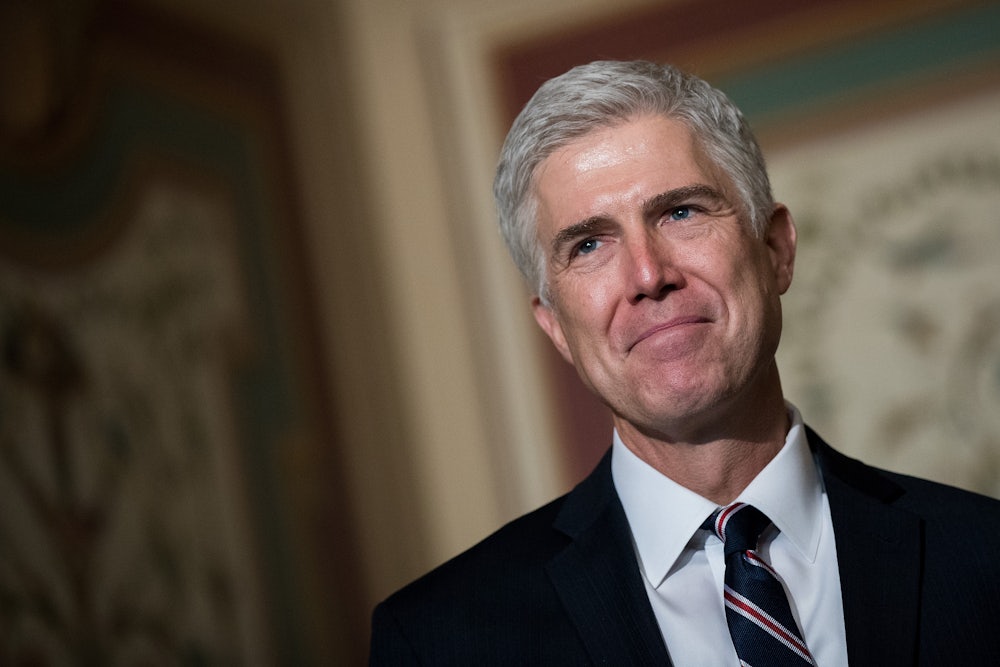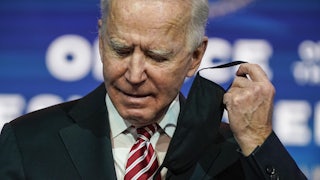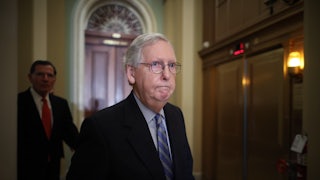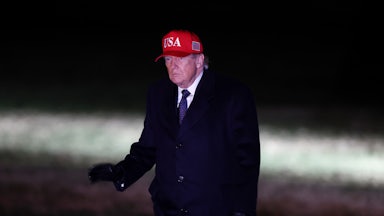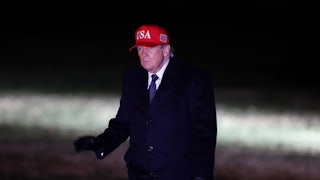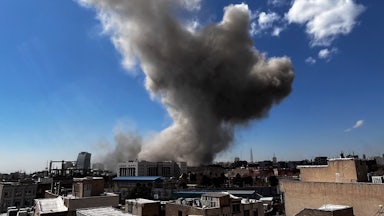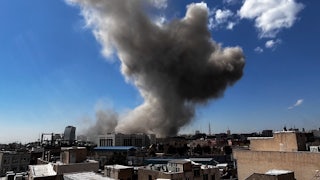For many purposes—notably, responding to a pandemic—a strong federal government is right handy. But for more than 200 years, some Americans, thinking that they were promoting personal liberty, have tried to persuade the Supreme Court to interpret federal law in a way that would hobble the government. It is happening again with Covid-19. And once again the argument focuses on a technical legal question about the meaning of the word necessary. The court gave the right answer in 1819. If it gets it wrong this time, thousands will die.
This Friday, the court will hear oral arguments in legal challenges to two of President Biden’s Covid vaccine mandates. One of those rules governs medium-size and large workplaces; the other focuses on health care workers. In both, the court must decide whether the rules are authorized by the relevant federal statutes. The challenges are legally weak, but the court may not see it that way. A faction led by Justice Neil Gorsuch has been shockingly cavalier about the dangers of vaccine resistance—and there’s one particularly bad argument that is likely to tempt Gorsuch’s cohort.
In early February, the Labor Department’s Occupational Safety and Health Administration announced an emergency rule requiring employers of 100 or more employees to ensure their workers are fully vaccinated against Covid-19 or otherwise are tested weekly. The authorizing statute in the U.S. Code provides that, in an emergency, OSHA “shall” promulgate an “emergency temporary standard,” or ETS, that takes “immediate effect.” Before doing so, the agency must determine “that employees are exposed to grave danger from exposure to substances or agents determined to be toxic or physically harmful or from new hazards” and that an “emergency standard is necessary to protect employees from such danger” (my emphasis).
Covid-19 is obviously a “grave danger” and “physically harmful,” and the necessity of the rule is clear: OSHA estimated that this move would “save over 6,500 worker lives and prevent over 250,000 hospitalizations over the course of the next six months.” Two members of a three-judge panel of the Sixth Circuit of the U.S. Court of Appeals agreed, upholding the regulation in Mass. Building Trades Council v. OSHA. “The ETS is not a novel expansion of OSHA’s power; it is an existing application of authority to a novel and dangerous worldwide pandemic,” the majority declared.
But Sixth Circuit Judge Joan Larsen dissented. A Trump appointee and former University of Michigan law professor, Larsen was on the short list to replace the late Justice Ruth Bader Ginsburg on the Supreme Court. Her arguments are important, because they are likely to have considerable weight with the court’s conservative majority.
In her dissent, Larsen observed that the OSHA statute only requires normal standards to be “reasonably necessary or appropriate” to address the problem, but “when conferring emergency authority on the Secretary, Congress shaved that down to ‘necessary.’ An emergency measure must, therefore, be more than ‘reasonably’ needful; it must be closer to ‘indispensable.’” She then enumerated other measures that OSHA could have enacted. OSHA might “have considered a standard aimed at the most vulnerable workers” or “have considered a standard aimed at specific industries or types of workplaces with the greatest risk of COVID-19 exposure.”
Larsen acknowledged that the question of the meaning of “necessary” has been before the federal courts before, most prominently in the 1819 decision McCulloch v. Maryland. The question in that case was whether Congress could charter a national bank. Such a bank was convenient for many federal purposes, notably paying troops in distant outposts. (It was easier to print banknotes locally than to transport gold coins by stagecoach.) The Constitution, after enumerating congressional powers, authorizes Congress to “make all Laws which shall be necessary and proper” to carry out its responsibilities. Chief Justice John Marshall rejected the claim that “necessary” must mean “absolutely necessary,” which would make the government “incompetent to its great objects.” Instead, the word “frequently imports no more than that one thing is convenient, or useful, or essential to another.” So Congress, he held, can use any convenient means to carry out its powers. Larsen frankly acknowledged McCulloch’s reasoning but claimed that it did not apply to the OSHA statute.
Her reading of the statute is incoherent, and if the Supreme Court took a similar view, it would cripple the power that Congress delegated to the agency. To see why, consider what Justice Joseph Story, who was part of the unanimous court in McCulloch, later wrote about the case in his 1833 three-volume work, Commentaries on the Constitution of the United States. He observed that if a specific exercise of power had to be absolutely necessary, then some powers could not be exercised at all; one could always imagine an alternative to whatever the government does. He wrote:
It will be found that the operations of the government, upon any of its powers, will rarely admit of a rigid demonstration of the necessity (in this strict sense) of the particular means. In most cases, various systems or means may be resorted to, to attain the same end; and yet, with respect to each, it may be argued, that it is not constitutional, because it is not indispensable; and the end may be obtained by other means. The consequence of such reasoning would be, that, as no means could be shown to be constitutional, none could be adopted. For instance, Congress possesses the power to make war, and to raise armies, and incidentally to erect fortifications, and purchase cannon and ammunition, and other munitions of war. But war may be carried on without fortifications, cannon, and ammunition. No particular kind of arms can be shown to be absolutely necessary; because various sorts of arms of different convenience, power, and utility are, or may be resorted to by different nations. What then becomes of the power?
Story’s reasoning applies perfectly to Larsen’s argument. Larsen demands that OSHA devise a more fine-grained regulation. It must pick and choose among “specific industries” or the most dangerous “types of workplaces,” based upon data that is uncertain and changing. It’s not clear that any regulation could satisfy her. Her colleagues in the majority wrote that “such a cramped reading of the statute would require OSHA to prognosticate an emergency and devise the most narrowly tailored [rule] to entirely remove the grave danger from the workplace. But in virtually every emergency situation … no precaution proposed by OSHA could ever be 100 percent effective at quelling the emergency.” Story was right: It will always be possible to devise alternatives.
Marshall wrote in McCulloch: “Is that construction of the constitution to be preferred which would render these operations hazardous, difficult, and expensive?” The same could be asked of Larsen’s proposed limit on OSHA’s emergency powers. She argues in her dissent that, given the ambiguity of “necessary,” “the choice between meanings is revealed by context.” Story shows why the word can never mean what she takes it to mean: a judicially enforceable demand that the state show that the way it chose to address a problem was “indispensable.” Larsen is right that context matters. But it doesn’t help her. Her demand would be particularly misguided when one considers the most important aspect of the context that she leaves out, which is that this is an emergency power. It can only be invoked when there is a serious danger to workers’ lives or health. The Covid epidemic is the worst possible occasion for the court to constrain OSHA with a novel requirement that invites litigation and delay. That delay will—and has—cost lives.
